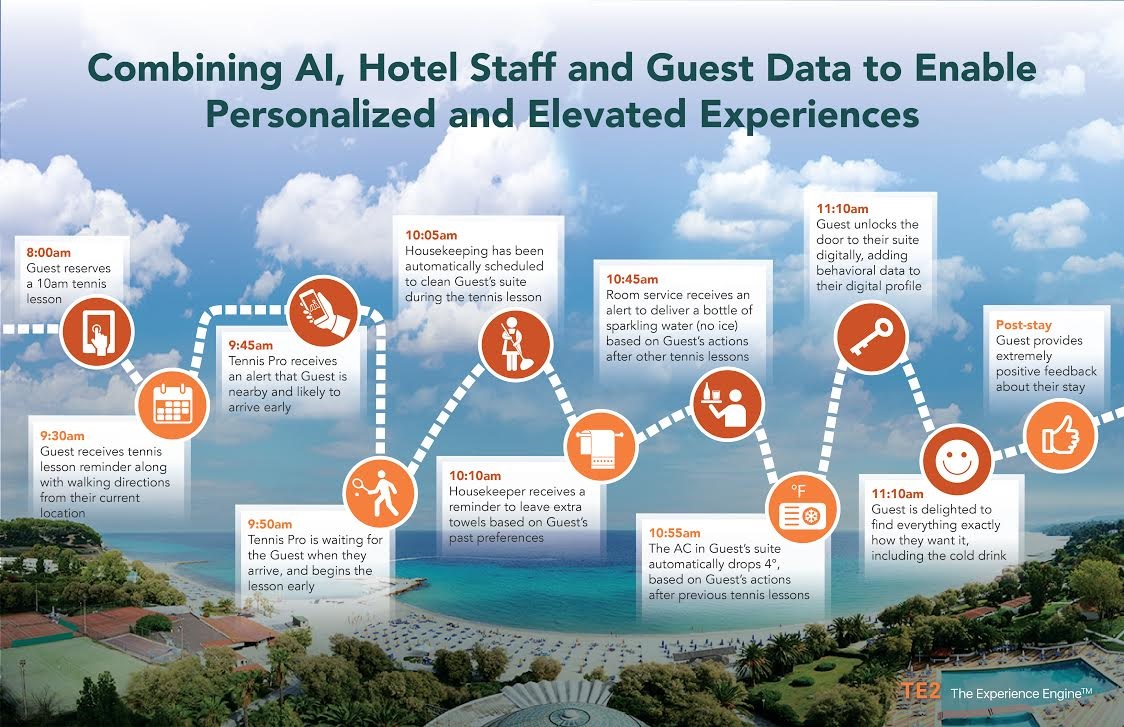Technology is changing the way hotels deliver services to guests, especially in the luxury segment. For food and beverage programs technology is raising the bar for both anticipating guests’ needs and delivering on what they want in new ways.
“Within the luxury segment in hospitality, artificial intelligence and (Internet of Things) technologies can be used to improve the guest experience by empowering staff to anticipate and respond to each guest’s need in a personalized way,” said Matt Oberdorfer, Experience Engine vice president of product, in an interview with SmartBrief. “For example when a guest is heading back to his/her room after a tennis game, it can be automatically detected and communicated to the concierge to arrange for cold drinks without the guest having to place a request.”
One way hotel food and beverage programs are staying ahead of the game when it comes to technology is via partnerships. Carlson Rezidor Hotel Group, for example, has partnered with India’s online reservation service Dineout, giving people the ability to use the Dineout platform for making reservations across any of the group’s 140 properties. “Dineout’s technology exposes customers to more brand experiences through their devices and social media, while helping our hotels and their F&B outlets achieve greater competitive advantage,” said Carlson Rezidor’s Sandy Russell, as quoted in the Economic Times.
Hotels themselves are also seeking to make the most of technology, with major brands such as Marriott International relying heavily on its mobile app to both reach and respond to guests. Guests’ use of mobile devices to communicate with Marriott has quadrupled in recent years, Marriott’s senior vice-president for digital, George Corbin, told the Straits Times. Marriott was among the first major chains to launch its own mobile app and since then the company has continued to add features and capabilities including the ability to contact hotel staff, check-in, and even use a smartphone as a room key.
“Two of the biggest emerging trends are personalization and conversational guidance based on machine learning and artificial intelligence,” added Experience Engine’s Oberdorfer. “With these technologies a luxury hotel can truly anticipate what a guest wants, even before they are aware of it themselves. Using ML and AI to detect behavioral patterns, to anticipate needs based on previous behavior, it is possible to facilitate room customizations, personalized check-ins, food order and delivery time and even a limo ready at checkout time, etc. all without using valuable hotel resources.”
Hotel food and beverage programs have help when it comes to keeping pace with changing technologies as companies such as Wi-Q Technologies and others create new tools specifically for the hotel food and beverage segment. Wi-Q recently launched a cloud-based application for guest services requests called Mi-Room. Guests do not have to download the app, but instead can access it from any internet-enabled device.
“Following the launch of Wi-Q, our cloud-based ordering system that has been implemented in restaurants worldwide, a London hotel group expressed a need for our technology to enhance the guest room services of their hotels,” said Wi-Q Technologies’ Graham Cornhill in a Paymnts.com article. “Through targeted research, it quickly became apparent that they weren’t alone, so we started developing software specifically for that purpose.”
_________________________________________________
If you enjoyed this article, join SmartBrief’s email list for more stories about the food and beverage industry. We offer 20 newsletters covering the industry from restaurants to food manufacturing.
